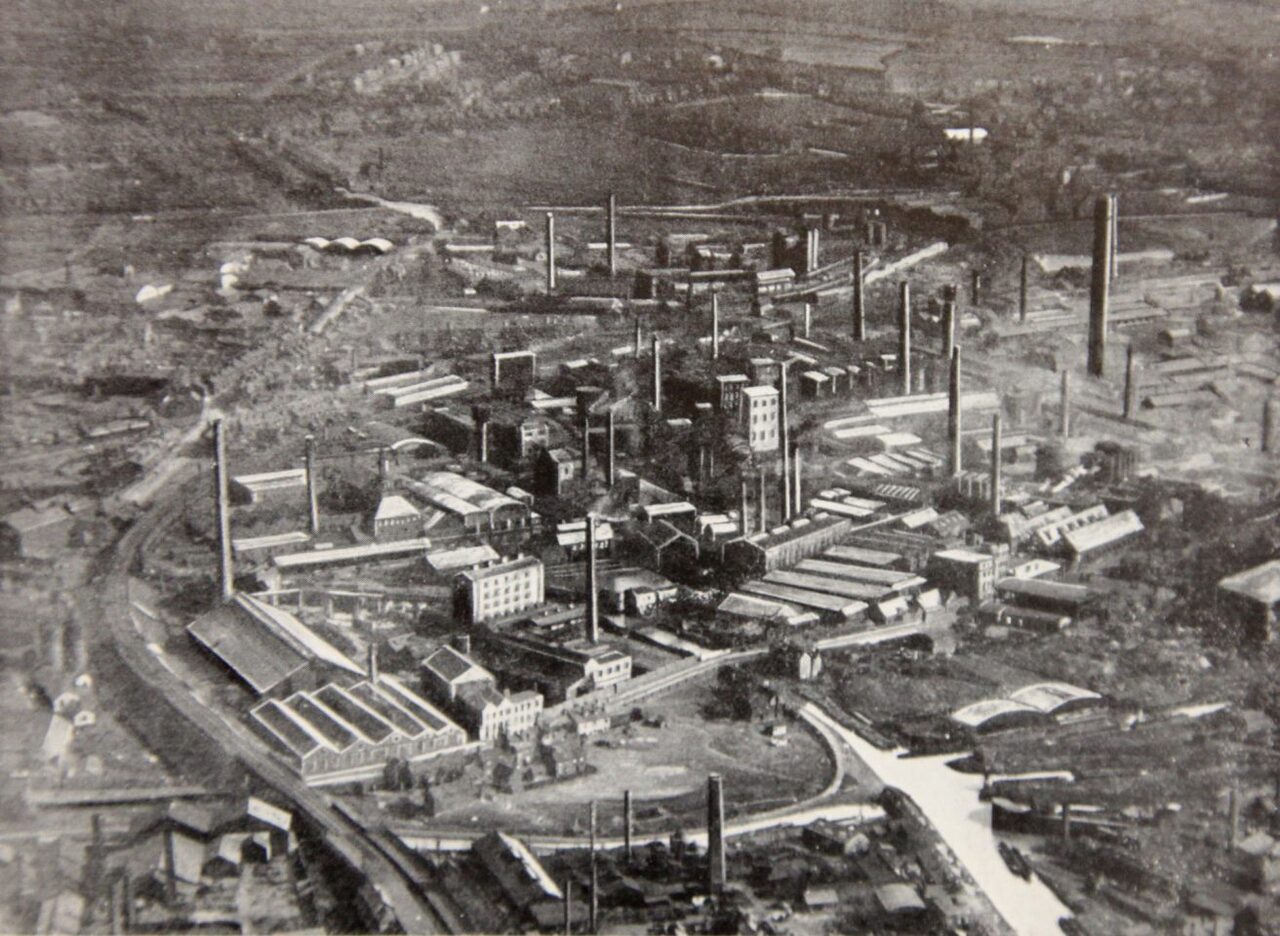
JAKE COLLINS AND THE ALKALI WORKS
The town of Oldbury borders on Blackheath, scene of a major part of the action in Black Hearts And Blue Devils. At the turn of the eighteenth century Oldbury had been an ancient but always small rural village based around agriculture and some small-scale nail-making. But then came the Industrial Revolution of course!
By the 1860s a small party of self-styled Bohemian gentleman-travellers described the town thus:
"Passing the outskirts of Birmingham, where the tall factory chimneys rise at intervals on either side of the railway line, leaving the charming suburb of Edgbaston and the manufactories of Soho and Smethwick, the approach to Oldbury is marked by a heavy pall of smoke which, hanging over the whole tract of the country, shrouds nature in a dun eclipse. Amidst an undefinable labyrinth of pit banks and hillocks, mounds of cinder, craggy masses of clinker, often lighted by a lurid glare into strange and fitful shape, rise the more regular forms of innumerable shafts, kilns, tall, pyramidal blast-furnaces, and strange uncouth machinery. Crowded together amidst this volcanic waste, as though separated for ever from the life of villages and country homesteads, lie the pitbanks, the collieries, the forges, the works for iron and steel and gas, tin and tar, copper, oil, and lead, the soaperies, the distilleries, the potteries, and, as it seems, a hundred others, for supplying the world with material which has become a second nature wrung from the necessities of the first. Here, amidst din and clangour, rises the hot breath of a thousand forges, the heavy vapour of brick and lime-kilns, the black and choking smoke of mighty fires, all mingling in one great, black, boding cloud which broods immovable above the earth."
As some of you will recognise, I have drawn on such contemporary imagery when describing the settings for Black Hearts. Oldbury has always been known for its chemical works in particular, such as Albright and Wilson and ICI. And it is from ICI's antecedents in the area that I have linked the character of Jake Collins. Jake is a young lad taken from the streets and helped by Josh Lively. Jake, and his poignant statement given to the police, are based on a real-life person. In the book, I have him working at the alkali works in Oldbury. That works, in "real life" would have been the premises occupying nine acres of land purchased in 1835 by Chance Brothers (the famous Smethwick glass-making firm which also gets a mention in Black Hearts). The factory was built to make saltcake a product used chiefly in the manufacture of glass, ceramic glazes, soaps, and sodium salts. The process uses sulphuric acid made from brimstone, used with salt to produce the required salt cake. It was hard and hot work and there was exposure to sulphuric acid fumes. In a related process workers' respiratory systems would have been exposed to powdered lime and chlorine gas, amongst other pernicious irritants. The works also produced acids, caustic soda, soda ash, ammonia compounds, and later added copper, zinc and cadmium compounds and cement to its list. With the First World War the firm was involved in the manufacture of TNT and ammonium nitrate. Their TNT plant was built with some urgency, one million bricks laid in 19 days and TNT dispatched after just 14 weeks. By the end of 1915 they were producing 170 tons a week and by 1918 this had increased to 500 tons a week. In 1916, under conditions of great secrecy, Oldbury Carriage Works began production of a new weapon of war, the tank, producing the first 1000. Their wheels, frames, ironwork, and other components came from local factories and expertise in the Black Country. Even the testing was done in Oldbury. In 1918, they produced over 2000 tanks at short notice for use in the 100 Days Offensive, which saw the beginning of the end of WW1. Not a stretch of the imagination then for Hiram Maxim to have visited (see my last post/blog).
In 1915, in ‘Oldbury Round and About’, F.W. Hackwood wrote that:
"Corroding gases emitted from chemical works in the heart of the town so completed the blight that even the grass and the hardiest of plants failed not to succumb. Not by incessant labour could Oldbury housewives keep fire irons or other utensils of bright steel in any desirable condition of cleanliness; metal tarnished in a single night and in the process of time faded away as they had been petals of a fading flower."
Again, readers might recognise my reference in the second chapter of Black Hearts.
On a personal note, I can also testify to the concoction of smells which emanated from Oldbury, even as late at the 1970s - this is referred to in Black Hearts too!
It was lucky for young Jake that he got out!
Post Views : 334